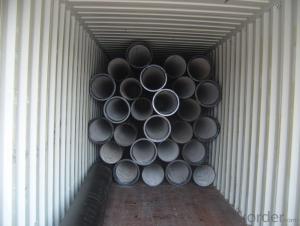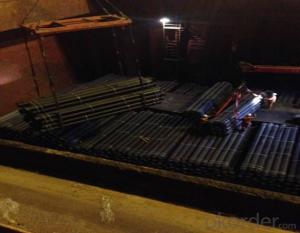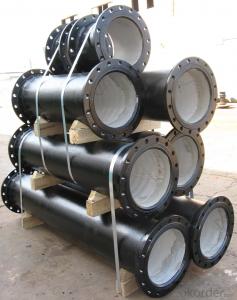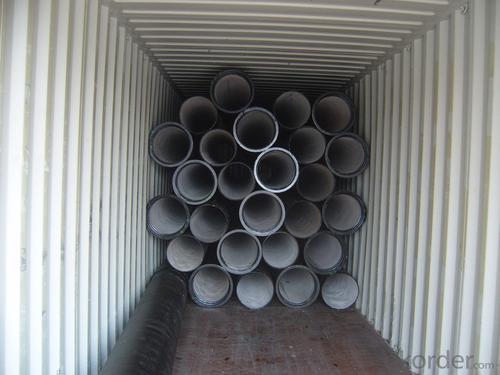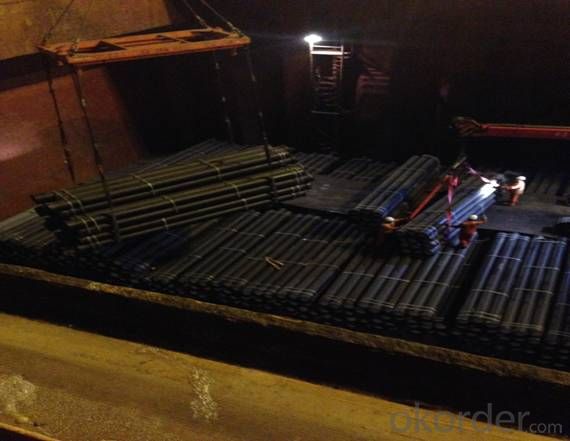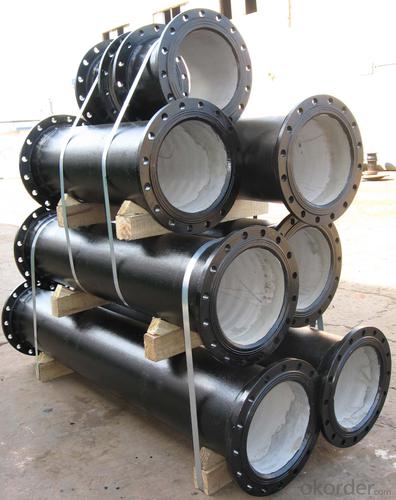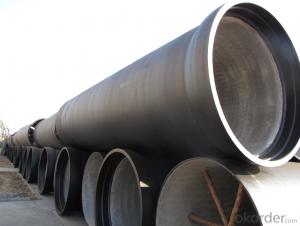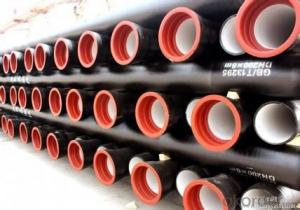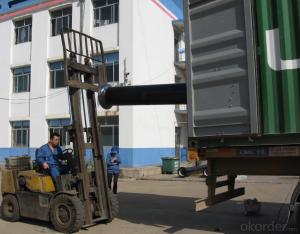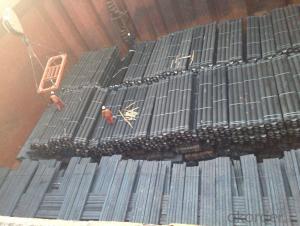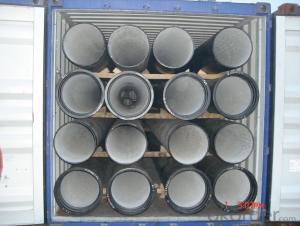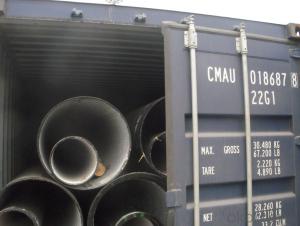DUCTILE IRON PIPES K8 DN200
- Loading Port:
- China Main Port
- Payment Terms:
- TT or LC
- Min Order Qty:
- 1 pc
- Supply Capability:
- -
OKorder Service Pledge
OKorder Financial Service
You Might Also Like
Ductile Iron Cast Pipe is without any defects compare with tradition casting tech, which has many advantages particularly as follow:
(1) High density. In the "vertical upward casting" process, the melt iron of centre liquid column in center crystallizer is continuously feeding for volume shrinkage caused by condensation tube at outer circumference , which lead to be free of shrinkage porosity.
(2) High purity. When melt iron pouring, the mixed impurities such as gas, dross, sand grain which are lighter than melt iron could be eliminated at furnace mouth, its impossible to enter into the crystallizer through the channel, so the melt iron into the crystallizer is very pure.
(3) Strength with toughness. The cooling speed provided by continuous crystallizer is 30 times than sand casting and 5 times than centrifugal casting, and doesn't produce white iron, the eutectic cell volume of continuous cast iron is one eighth to one tenth compare with traditional cast iron. The density of graphite nodule in ductile iron can reach 300-700 pcs/mm2. Therefore, all reason above improve the strength and toughness of continuous cast iron.
(4) Free machining. The high speed cooling make the hardening phase (such as boride, steadite) not appear like reticular, massive or thick, but diffuse like fish bone and pane in shape, moreover, there are tiny graphite flakes inlaid hardening phase. It's free machining in BrinellHardness the range of 250-300HB. However, the Brinell Hardness of 250 is top limit to common metal materials.
(5) High productivity. To the wall thickness of tube under 10mm, the speed of continuous casting is 1 meter/min, to the wall thickness of tube under 20mm, the speed of continuous casting is 0.5 meter/min, which is high efficiency that centrifugal or other casting tech couldn't reach.
- Q: Can ductile iron pipes be used for irrigation systems in saline soil conditions?
- Yes, ductile iron pipes can be used for irrigation systems in saline soil conditions. Ductile iron pipes have excellent corrosion resistance properties, making them suitable for use in saline environments. However, it is important to consider the specific requirements and consult with experts to ensure proper selection and installation methods are implemented for optimal performance and durability in such conditions.
- Q: Can ductile iron pipes be used for geothermal systems?
- Yes, ductile iron pipes can be used for geothermal systems. Ductile iron is known for its strength, durability, and corrosion resistance, making it suitable for various applications including geothermal systems. These pipes can handle high temperatures and pressure fluctuations commonly found in geothermal systems. Additionally, ductile iron pipes have excellent thermal conductivity properties, allowing for efficient heat transfer between the geothermal fluid and the surrounding environment. Therefore, ductile iron pipes are a viable option for transporting geothermal fluids in geothermal systems.
- Q: How are ductile iron pipes protected against freeze-thaw cycles?
- Ductile iron pipes are protected against freeze-thaw cycles through several measures. Firstly, the material used in ductile iron pipes is inherently resistant to low temperatures and can withstand freezing conditions without becoming brittle or prone to cracking. Additionally, the pipes are often coated with a protective layer, such as cement mortar lining or polyethylene encasement, to provide an extra barrier against freeze-thaw damage. These coatings serve to insulate the pipe and prevent direct contact between the iron and the surrounding environment. Furthermore, ductile iron pipes are commonly designed with joints that allow for movement and flexibility, which helps to accommodate any expansion or contraction that may occur during freeze-thaw cycles. This flexibility reduces the risk of pipe breakage or damage due to the pressure exerted by freezing water inside the pipe. Moreover, proper installation practices, including adequate bedding and backfilling, are crucial in protecting ductile iron pipes against freeze-thaw cycles. Ensuring that the pipes are properly supported and surrounded by suitable materials helps to minimize the impact of freezing temperatures on the structural integrity of the pipes. Regular inspection and maintenance of ductile iron pipes are also essential in identifying any potential issues caused by freeze-thaw cycles. Periodic assessments can help detect any signs of damage or deterioration, enabling timely repairs or replacement to prevent further damage. In summary, ductile iron pipes are protected against freeze-thaw cycles through the inherent resistance of the material, protective coatings, flexible joints, proper installation practices, and regular maintenance. These measures collectively contribute to the durability and longevity of ductile iron pipes, even in cold weather conditions.
- Q: Can ductile iron pipe be used for water treatment plant sludge handling?
- Yes, ductile iron pipe can be used for water treatment plant sludge handling. Ductile iron pipes are known for their durability, strength, and resistance to corrosion, making them suitable for handling various types of wastewater and sludge. They can efficiently transport sludge from different stages of the water treatment process within the plant without any adverse effects.
- Q: Is ductile iron pipe breakable?
- 5, inferior wood surface is easy to produce cracks, because its billet is adobe, Adobe porous, Adobe in the process of cooling due to the role of thermal stress, cracks, after rolling, there are cracks;6, poor drainage tube appearance often pitted phenomenon. Pits is due to groove wear caused by defects in pipe surface irregular uneven. Because of the poor sewer pipe manufacturers to pursue profits, often rolling groove rolling most standard.Ductile iron pipes are broken because of the excessive heat treatment during casting or the lack of proper addition in casting to prevent a change in the proper brittleness and to cause cracking. It is recommended that you used to repair defects of cast iron machine, are currently on the market to sell, but also can ensure welding intact appearance, make your products by quality, but if it is in the use of performance can not meet the effect, especially the pipeline pressure quite big, what methods are of no use that must be re cast as the new.
- Q: Can ductile iron pipes be used for underground drainage systems?
- Indeed, underground drainage systems can utilize ductile iron pipes. Ductile iron, being a robust and enduring substance, exhibits resistance to corrosion, rendering it appropriate for subterranean applications. Possessing remarkable tensile strength, it can endure substantial loads and pressures, thereby making it an excellent choice for drainage systems that encounter significant flow rates or necessitate substantial burial depths. Moreover, ductile iron pipes boast an extended lifespan, thereby decreasing the requirement for frequent maintenance or replacement. All in all, ductile iron pipes prove to be an unwavering and efficient option for underground drainage systems.
- Q: Can ductile iron pipes be used in gravity sewer systems?
- Yes, ductile iron pipes can be used in gravity sewer systems. Ductile iron pipes are known for their strength, durability, and resistance to corrosion, making them suitable for carrying wastewater under gravity flow conditions.
- Q: How does ductile iron pipe handle thermal expansion and contraction?
- Ductile iron pipe is able to handle thermal expansion and contraction effectively due to its inherent flexibility and strength. Its unique composition allows it to withstand the expansion and contraction caused by temperature fluctuations without breaking or becoming brittle. This property is crucial in preventing any damage to the pipe or its fittings, ensuring a reliable and durable pipeline system.
- Q: Can ductile iron pipes be used for firefighting systems?
- Ductile iron pipes are capable of being utilized in firefighting systems. This material, known for its strength and resilience, can withstand intense pressures and extreme temperatures, thereby making it a suitable option for transporting water in such systems. Moreover, the pipes' resistance to corrosion and ability to handle external loads guarantee their long-term dependability and effectiveness. Furthermore, ductile iron pipes possess exceptional fire-resistant qualities, as they are non-combustible, do not emit harmful fumes, and do not contribute to the propagation of fire. Consequently, due to their robustness, durability, and fire resistance, ductile iron pipes are widely chosen and trusted for firefighting systems.
- Q: How do ductile iron pipes perform in freeze-thaw cycles?
- Ductile iron pipes demonstrate exceptional performance in freeze-thaw cycles due to their material properties. With high tensile strength and excellent impact resistance, ductile iron is highly resistant to the stresses caused by freezing and thawing. Unlike other materials, these pipes can withstand the expansion and contraction during temperature changes without cracking or breaking. One of the primary reasons for the success of ductile iron pipes in freeze-thaw conditions is their capacity to absorb and dissipate stresses. The material's high ductility allows for slight deformation under stress, releasing pressure and preventing pipe damage. This characteristic ensures that the pipes can endure repeated freezing and thawing cycles without compromising their structural integrity. Furthermore, ductile iron pipes feature a durable and protective coating, such as cement mortar lining or polyethylene encasement, which further enhances their resistance to freeze-thaw cycles. These coatings offer an extra layer of protection, preventing direct contact between water and the iron and reducing the risk of corrosion. Moreover, ductile iron pipes have an extended service life, often exceeding 100 years, thanks to their inherent strength and resistance to various environmental factors, including freeze-thaw cycles. The pipes' ability to endure these cycles without significant damage ensures the reliability and durability of water distribution systems, even in regions prone to freezing temperatures. In conclusion, ductile iron pipes are highly dependable and excel in freeze-thaw cycles. Their high tensile strength, impact resistance, capacity to absorb stresses, and protective coatings make them the preferred choice for water distribution systems in areas with harsh winter conditions.
Send your message to us
DUCTILE IRON PIPES K8 DN200
- Loading Port:
- China Main Port
- Payment Terms:
- TT or LC
- Min Order Qty:
- 1 pc
- Supply Capability:
- -
OKorder Service Pledge
OKorder Financial Service
Similar products
Hot products
Hot Searches
Related keywords
